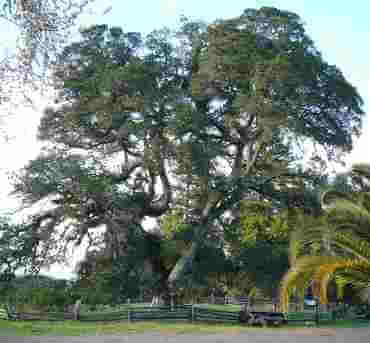Tree

In general, trees represent the deepest and most significant intellectual concepts: the ones that come to us most directly from the Lord. This varies depending on us and our states: the people of the Most Ancient Church, who were in a state of loving the Lord, understood truth automatically and internally through what the Writings call "perception"; people in lower states (including most of us) have to work a little harder to learn it from the Word and by willing to follow the Lord. In other parts of the Bible, especially in the prophets and New Testament parables, the meaning of "tree" is broader, meaning not just a person's intellectual concepts but the whole person.
'Trees,' as in Joel 1:10-12, signify knowledges.
Arcana Coelestia # 1232
1232. That 'Aram' or Syria means cognitions of good follows from what has been said above as well as from the Word: in Ezekiel,
Aram was your merchant in the multitude of your handiworks; they exchanged for your wares chrysoprase, purple, and embroidered work, and fine linen, and ramoth, 1 and rubies. Ezekiel 27:16.
This refers to 'Tyre' or the possession of cognitions. Here 'handiworks, chrysoprase, purple, embroidered work, fine linen, ramoth, and rubies' means nothing else than cognitions of good. In Hosea,
Jacob fled into the field of Aram and served for a wife, and for a wife kept guard. And by a prophet Jehovah brought Israel up out of Egypt, and by a prophet he was preserved. Ephraim has provoked to anger most bitterly. Hosea 12:12-14.
Here 'Jacob' stands for the external Church, and 'Israel' for the internal spiritual Church. 'Aram' stands for cognitions of good, 'Egypt' for knowledge that debases, 'Ephraim' for debased intelligence. What these mean in this context cannot possibly be deduced from the literal sense, only from the internal sense where, as has been stated, names mean things of the Church. In Isaiah,
Behold, Damascus has been rejected so that it is not a city; it has become a heap of ruins. The fortress will disappear from Ephraim, and the kingdom from Damascus; and the remnant of Aram will be like the glory of the children of Israel. Isaiah 17:1, 3.
Here 'the remnant of Aram' stands for cognitions of good which are called 'the glory of Israel'. 'Aram' or Syria also stands in the contrary sense for cognitions of good that have been debased, for it is usual in the Word for an expression to be used in both senses, see Isaiah 7:4-6; 9:12; Deuteronomy 26:5.
Poznámky pod čarou:
1. A Hebrew word, the meaning of which is uncertain







